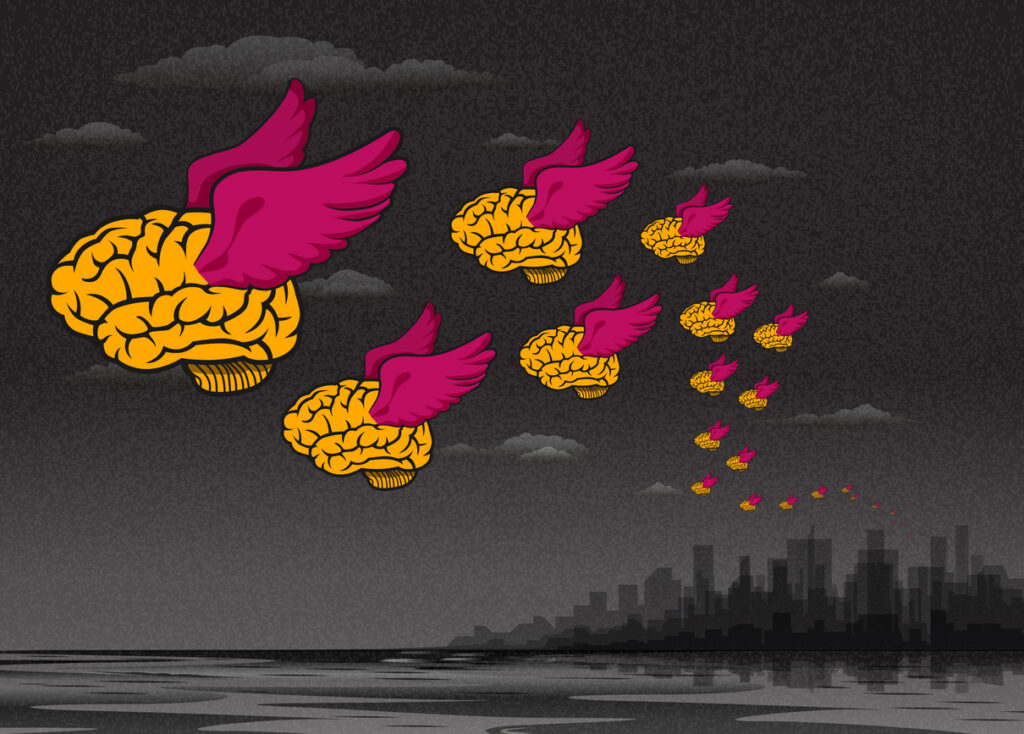We have just experienced a truly global event in the Covid-19 pandemic, something that affected every country in the world. And there are other global challenges the world is facing, including climate change, economic uncertainty, political unrest and more. At the organisation level, there are a host of common concerns, including burnout, the great resignation, and DEIB; along with common challenges of upskilling and reskilling, supporting hybrid teams, and incorporating digital appropriately.
The hyper-collaboration mindset is that someone somewhere has probably figured out what works best to meet your need, and it is unlikely that this person works in your company, or perhaps even in your industry
A new age of hyper-collaboration
These global challenges will not be solved by individual companies working alone. We are living in an age of hyper-collaboration, a concept based on the belief that it is innovation eco-systems that will deliver the new, needed solutions to what we are facing.
This applies also at the level of the team, where hyper-collaboration means that we should no longer expect teams to deliver solutions in isolation, but instead we should assume that the most effective team outputs will result from collaborations with other, sometimes unexpected, partners. In an effective innovation eco-system, it is the diversity and variety of complementary capabilities coming together to solve a particular problem that creates success rather than stability and longevity.
A recent example of this is the creation of the covid vaccine. No one company provided a vaccine completely on its own. Instead, there were many partnerships that formed, some of them quite unlikely, that allowed this innovative vaccine to be created and made available in such a short time frame.
The hyper-collaboration mindset is that someone somewhere has probably figured out what works best to meet your need, and it is unlikely that this person works in your company, or perhaps even in your industry. If we thought about challenges this way, that a solution already exists somewhere, but most likely not in the first place we would look; how would that change our approach?
Which of these components of hyper-collaboration might you leverage to support your organisation in addressing its biggest challenges?
1. Look for the unexpected
What non-obvious partners might you engage with? These might be outside your immediate team, function, organisation, region, or industry.
2. The more the merrier
Hyper-collaboration often involves lots of collaborating partners. Challenge yourself to include more partners than you normally would in a collaboration; and yes, this does mean there will be more complications to address. If the challenge is one that will benefit from hyper-collaboration, it is worth overcoming the complications.
3. Where’s the tech?
Technology is likely to have a place in a hyper-collaboration approach; either in the solution itself or in the management of the innovation eco-system developing the solution. What technologies from unrelated fields or industries might be brought in to help with your challenge?
4. Expect change
This is not the time to aim for stability or consistency. Changes will likely emerge in the approach to the challenge, suggested solutions, partners involved, and even goals and interests. Prepare people for change generally, as well as related to any specific challenge being addressed. Successful hyper-collaboration is not a given; it takes hard work. An ecosystem mindset and a teaming skillset are essential contributors to success.
The ecosystem mindset looks at the vision, purpose and strategy for the whole, and then sees the parts that individuals and teams could contribute.
Shifting to the eco-system mindest
This is all about having an ‘outside in’ perspective. Rather than thinking first about self and team and then what could come from partnering with other individuals and teams, the ecosystem mindset looks at the vision, purpose and strategy for the whole, and then sees the parts that individuals and teams could contribute.
This can be challenging because at some point any one individual or team may need to step aside for the good of the ecosystem. Individuals with an ecosystem mindset as well as a strong teaming skillset are better positioned to accept or even make this choice when necessary because they are primed to see additional opportunities where they can contribute.
Amy Edmondson, in her book Teaming, writes that ‘fast-moving work environments need people who know how to team, people who have the skills and flexibility to act in moments of potential collaboration when and where they appear.’
Embracing dynamism
Hyper-collaboration requires working in a dynamic environment where the people, projects, and even the processes and approaches that are prioritised shift regularly. In this environment, rather than focusing on team effectiveness at the level of the team, it is more effective to develop teaming skills in every individual.
Then, no matter which team a person is on; they contribute to its success by bringing their skills for being an effective team member. The effectiveness of a team where all team members bring a teaming skillset never depends on just one person, making it resilient in the face of the changes and challenges hyper-collaboration brings.
A team focus at all times
The teaming skillset includes awareness of self and others, personal leadership, and being a team diagnostician. Team members who are aware of their own strengths, weaknesses, values, and dreams, as well as the impact they have on those around them, are positioned well to contribute efficiently to the overall goal; and are able to support others to bring their unique gifts to the team.
When all members of a team bring this skill, the team as a whole is more likely to be agile and responsive to the shifting needs it exists to address
Personal leadership includes the ability to remain grounded in the face of the inevitable conflicts that arise in hyper-collaboration and to accept responsibility for their own attitudes and progress towards outcomes rather than blaming others. Being a team diagnostician requires a basic ability to identify team challenges and contribute to solutions. When all members of a team bring this skill, the team as a whole is more likely to be agile and responsive to the shifting needs it exists to address.
Given the increasingly complicated needs we are facing, in our teams, organisations, regions, and even in the world, hyper-collaboration is likely to increase. We can prepare people for successful hyper-collaboration by building an ecosystem mindset and teaming skills in every individual in our organisations.
Interested in this topic? Read Why collaboration is the key to learning in the new normal.
We have just experienced a truly global event in the Covid-19 pandemic, something that affected every country in the world. And there are other global challenges the world is facing, including climate change, economic uncertainty, political unrest and more. At the organisation level, there are a host of common concerns, including burnout, the great resignation, and DEIB; along with common challenges of upskilling and reskilling, supporting hybrid teams, and incorporating digital appropriately.
The hyper-collaboration mindset is that someone somewhere has probably figured out what works best to meet your need, and it is unlikely that this person works in your company, or perhaps even in your industry
A new age of hyper-collaboration
These global challenges will not be solved by individual companies working alone. We are living in an age of hyper-collaboration, a concept based on the belief that it is innovation eco-systems that will deliver the new, needed solutions to what we are facing.
This applies also at the level of the team, where hyper-collaboration means that we should no longer expect teams to deliver solutions in isolation, but instead we should assume that the most effective team outputs will result from collaborations with other, sometimes unexpected, partners. In an effective innovation eco-system, it is the diversity and variety of complementary capabilities coming together to solve a particular problem that creates success rather than stability and longevity.
A recent example of this is the creation of the covid vaccine. No one company provided a vaccine completely on its own. Instead, there were many partnerships that formed, some of them quite unlikely, that allowed this innovative vaccine to be created and made available in such a short time frame.
The hyper-collaboration mindset is that someone somewhere has probably figured out what works best to meet your need, and it is unlikely that this person works in your company, or perhaps even in your industry. If we thought about challenges this way, that a solution already exists somewhere, but most likely not in the first place we would look; how would that change our approach?
Which of these components of hyper-collaboration might you leverage to support your organisation in addressing its biggest challenges?
1. Look for the unexpected
What non-obvious partners might you engage with? These might be outside your immediate team, function, organisation, region, or industry.
2. The more the merrier
Hyper-collaboration often involves lots of collaborating partners. Challenge yourself to include more partners than you normally would in a collaboration; and yes, this does mean there will be more complications to address. If the challenge is one that will benefit from hyper-collaboration, it is worth overcoming the complications.
3. Where's the tech?
Technology is likely to have a place in a hyper-collaboration approach; either in the solution itself or in the management of the innovation eco-system developing the solution. What technologies from unrelated fields or industries might be brought in to help with your challenge?
4. Expect change
This is not the time to aim for stability or consistency. Changes will likely emerge in the approach to the challenge, suggested solutions, partners involved, and even goals and interests. Prepare people for change generally, as well as related to any specific challenge being addressed. Successful hyper-collaboration is not a given; it takes hard work. An ecosystem mindset and a teaming skillset are essential contributors to success.
The ecosystem mindset looks at the vision, purpose and strategy for the whole, and then sees the parts that individuals and teams could contribute.
Shifting to the eco-system mindest
This is all about having an 'outside in' perspective. Rather than thinking first about self and team and then what could come from partnering with other individuals and teams, the ecosystem mindset looks at the vision, purpose and strategy for the whole, and then sees the parts that individuals and teams could contribute.
This can be challenging because at some point any one individual or team may need to step aside for the good of the ecosystem. Individuals with an ecosystem mindset as well as a strong teaming skillset are better positioned to accept or even make this choice when necessary because they are primed to see additional opportunities where they can contribute.
Amy Edmondson, in her book Teaming, writes that 'fast-moving work environments need people who know how to team, people who have the skills and flexibility to act in moments of potential collaboration when and where they appear.'
Embracing dynamism
Hyper-collaboration requires working in a dynamic environment where the people, projects, and even the processes and approaches that are prioritised shift regularly. In this environment, rather than focusing on team effectiveness at the level of the team, it is more effective to develop teaming skills in every individual.
Then, no matter which team a person is on; they contribute to its success by bringing their skills for being an effective team member. The effectiveness of a team where all team members bring a teaming skillset never depends on just one person, making it resilient in the face of the changes and challenges hyper-collaboration brings.
A team focus at all times
The teaming skillset includes awareness of self and others, personal leadership, and being a team diagnostician. Team members who are aware of their own strengths, weaknesses, values, and dreams, as well as the impact they have on those around them, are positioned well to contribute efficiently to the overall goal; and are able to support others to bring their unique gifts to the team.
When all members of a team bring this skill, the team as a whole is more likely to be agile and responsive to the shifting needs it exists to address
Personal leadership includes the ability to remain grounded in the face of the inevitable conflicts that arise in hyper-collaboration and to accept responsibility for their own attitudes and progress towards outcomes rather than blaming others. Being a team diagnostician requires a basic ability to identify team challenges and contribute to solutions. When all members of a team bring this skill, the team as a whole is more likely to be agile and responsive to the shifting needs it exists to address.
Given the increasingly complicated needs we are facing, in our teams, organisations, regions, and even in the world, hyper-collaboration is likely to increase. We can prepare people for successful hyper-collaboration by building an ecosystem mindset and teaming skills in every individual in our organisations.








